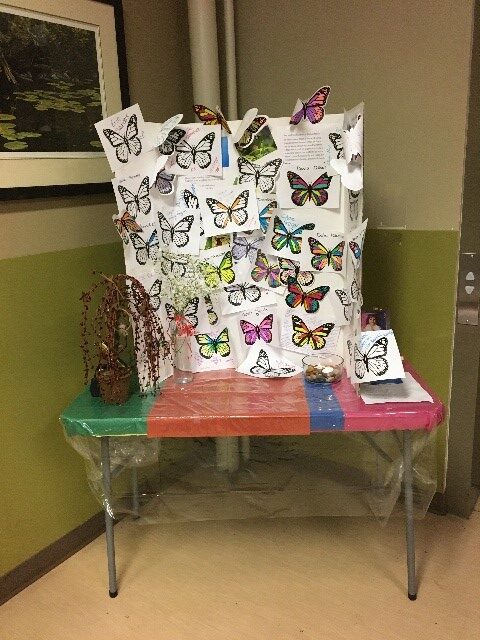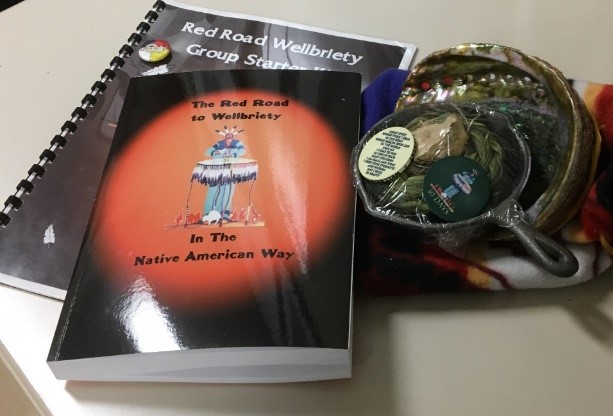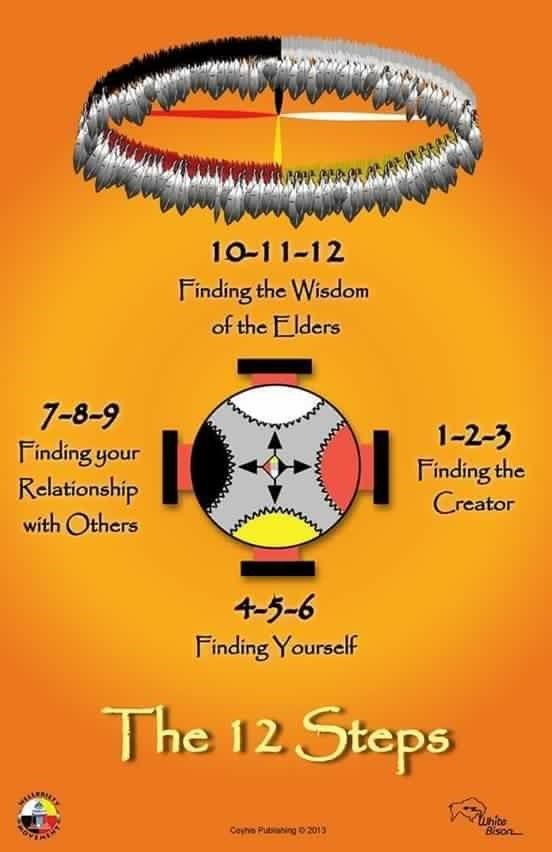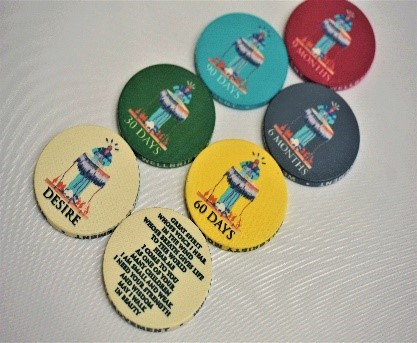Grief and Loss at Alpha House: A Personal Reflection*
Shaundra Bruvall | June 30, 2020
(* As a personal reflection I am recalling my own experience of what for most is a very personal experience and in no way am speaking for someone else’s experience.. Also this is not a speculation on causes of death which is probably at the expected rate for the size of the population of the city of Calgary)

And if the world has ceased to hear you,
Rainer Maria Rilke
say to the silent earth: I flow.
To the rushing water, speak: I am.
The above picture and poem are part of the pop-up memorial for clients that have died and are remembered by staff and other clients at Alpha House. At least twice yearly we commemorate the passing of clients with boards like the one above filled with coloured butterflies bearing the names of those who have recently passed away. The display is set up for a month and then we offer a memorial service for all wanting to attend. At the memorial service we drum and sing, offer smudge, lite candles, and speak prayers for a safe crossing as the names are read. We close with a favorite song, or with antidotes and stories of those who have passed. At the end refreshments often along with a meal is served, reminding us all that we need to care for ourselves as we grieve and move on with our lives.
Talking with staff and clients about grief and loss I have been told of some of the specific ways that people mark the death of someone they knew, worked with closely or carry in some way as a loss. Several take flowers they find growing wild or rocks that attract their eye and drop them into the Elbow River or Bow River from a bridge or shoreline, adding a prayer as they symbolically let the deceased person go. Some set adrift ordinary brown bags with a lighted tea candle inside and set them on the river just before dawn or later after sunset with a similar prayer of letting go. At one ceremony for a deceased staff member we set fifty or so helium filled balloons to the afternoon sky as a way of saying safe journey. Before COVID19 it is not unusual for staff and clients to join with family members and there memorial services for a love one. At times we have accommodated a family or group of friends to use our space at Alpha House for that purpose. Some client’s display their grief verbally with tearful out breaks and even what can seem like anger; some with the funny and the dear stories they remember. Staff debrief and talk things out with trusted colleagues and supports. Formally and informally those that survive find their ways to grieve and move forward from loss. As humans we need to express our grief and loss often collectively and always personally. Tears are shed and rituals are given meaning as we mark the dignity of life and of dying of those whose lives have touched our own.
My personal experience with death and dying spans my career as a social worker. My first job as a caseworker with the then known AIDS Calgary taught me a few things about grieving and its importance. My work at Alpha House has continued to be a teacher in this regard. Many of our people have died without family near and as staff we were in that fortunate place to bear witness to their life, truly an honour. In these days of COVID19 as it once was during the AIDS epidemic it seems like grief and loss is everywhere. All the more reason to rely on rituals especially those specific to ourselves to acknowledge the impact of loss in our collective and personal lives. Under COVID19 restrictions our group memorial will have to wait as we remain attuned to the expression of grief.
To bear witness at the passing of a client I have known is to not give in to the adage that ‘the person now is in a better place’. It may be true they are, but I have learned that people can be the most alive in their dying. I often use phrases like ‘they are in a better place ‘or ‘at least they are no longer suffering’ to give reason to the experience that even when someone’s dying is expected it can often feel sudden and too soon. By not using these phrases or getting beyond them I am better able to speak to their lived lives; the great desire people have to keep living through the difficult challenges of addiction and mental health. Death came as clients were busy living, loving and caring in the best ways they knew.
This doesn’t mean we forget what can improve people’s lives and the challenges they face. Each passing reminds us to keep to the task at hand of improving the lives that we touch and touch us. Issues from poverty to homelessness, racism and colonialism and the failed war on drugs are part of this ongoing work. The lives of those who have died help us to remember the ongoing work as a society we need to do.
Alpha House takes people where they are at and our challenge is to advocate for change in our non-judgmental capacity. It is helpful to recall the community the client lived in and drew support from and not just their history of trauma and missteps they may have taken. That is why when family and friends come to a service we are hosting or when we can attend one of theirs what makes us equals shine through. When clients who knew the deceased gather outside for an impromptu remembrance these can be so meaningful. When staff and clients can share smudge (outside in small gathering these days) closure is made possible.
For the clients who have died I remember them as people who lived resourcefully, with humor, resilience, eccentricity, and with love and caring for others in all ways that humans express their humanity to each other. Addiction and mental health in the end didn’t defeat them, just as addiction and mental health aren’t the conclave of the marginalized, homeless and impoverished as it crosses all social and economic status. I choose to recall the aliveness, joy, love and cultural expression of those who have gone before.
David is marking his 25th year of service at Alpha House with a series of blogs.


